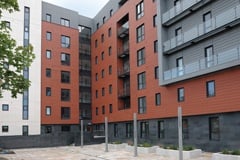Aerolite is sold by TI Dynamic Facades. It is made in China and installed as a rain screen or closed joint façade using the TI tracking rail system. It is available in sandstone, limestone, granite, basalt and marble sourced from around the world.
The stone is cut to between 6mm and 12mm thick then impregnated with resin to increase its flexural strength and stop it being porous. It is reinforced with a glass fibre or aluminium backing and, more recently, an aluminium honeycomb backing because it was being asked for as an alternative to the American system from Stone Panels. TI use a different fixing system to Stone Panels.
TI like to keep panels down to less than 50kg so that two people can lift them under current health and safety regulations. But that means a panel is limited about 1m2 and panels are available up to a size of 2.4x1.2m.
Everything is tested by Taylor Woodrow, and Barry Hunt, a consultant and this magazine’s Ask the Expert columnist, is involved with product development.
William Harwood, director of TI Dynamic Facades, told NSS, that when they started supplying granite panelling eight years ago, at that time buying it from Italy, they sold less than 200m2 a year. Now, and in spite of a fall in sales due to the recession, they are selling
6-10,000m2 a year and, says William, currently have enquiries on their books for 20,000m2.
They have not used any British stone with Aerolite, but that could be about to change. William says they are currently talking with major British stone suppliers, although the stone will go to China for the panels to continue to be made there.
“I have no doubt this is the way of the future and that most facades going forward will be on some kind of frame.” His conviction is based partly on the belief that nobody wants to train or be reliant on a skilled workforce.
He continues: “There will be projects that will still require conventional stone but they will become less and less and less because the designs will change.”
As far as William Harwood is concerned he is simply keeping stone available as an option in a changing world. “I would like to think we are taking stone into another arena,” he says. “If we do this we can still keep stone on buildings.”
The latest project where Aerolite has been used is the £25million Elysian Fields residential development in Liverpool city centre, where 15mm thick Imperial Black granite was used with a reinforced glass fibre backing.
Granite panels 1200x300mm have been used on 450m2 of the ground floor, including the area surrounding the main entrance. At higher levels single skin Terracotta rainscreen has been used.
The lightweight design of Aerolite granite was ideal for the pre-fabricated sub-wall construction used at Elysian Fields. Façade specialists Norking Aluminium installed the panels.

